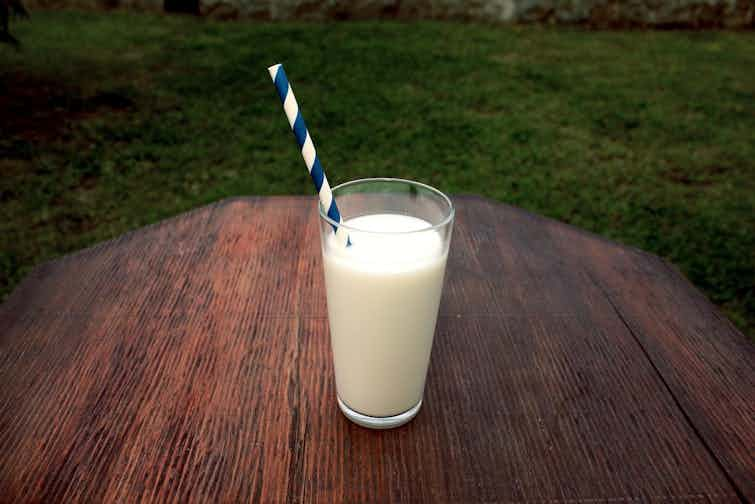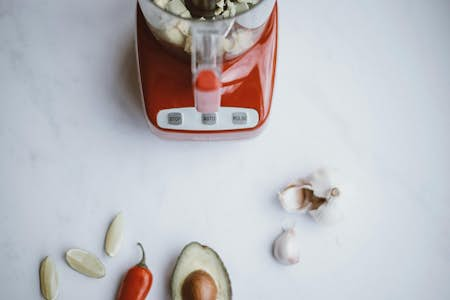Milk can help acid reflux, providing temporary heartburn relief. This is because milk is alkaline and can help neutralize stomach acid temporarily, which may provide relief from heartburn or acid reflux symptoms in the short term. However, its high fat and calcium content can cause issues for some patients.
Learn about the causes, symptoms, and trigger foods associated with acid reflux - and how you can use milk to help your condition.
What is acid reflux?
Acid reflux is a gastro-esophageal reflux disease (GERD) where stomach acid leaks up the esophagus. A weakening of the ring of muscle at the bottom of your esophagus typically causes this condition. This muscle controls stomach acid, making sure it stays in your stomach.
If you struggle with acid reflux, however, acid can come back up into the esophagus - causing GERD symptoms.
Acid reflux can be influenced by external factors such as obesity, smoking, and stress. The foods you eat can also have a big effect on this gastrointestinal problem, including acidic foods like citrus fruits. For this reason, making certain lifestyle changes can help you manage mild acid reflux, such as choosing smaller meals or avoiding trigger foods.
You can also use an over-the-counter medication like antacids to manage your condition and provide immediate heartburn relief. Speak to your doctor or gastroenterologist for advice if you’re experiencing painful acid reflux symptoms before trying any treatment options.
Symptoms of acid reflux
There are a few common symptoms of acid reflux, including:
- A burning sensation in your chest (heartburn)
- Bloating
- Upper abdominal or chest pain
- Trouble swallowing or a lump in your throat
- Chronic cough
- Regurgitation
- Hoarseness or sore throat
These symptoms can get particularly uncomfortable after eating a trigger food, such as fried foods. Your indigestion may also feel worse at night or when you lie down. It's important to note that the symptoms of acid reflux can vary in intensity and may not be experienced by every individual.
Acid reflux trigger foods
Although acid reflux isn’t always caused by the food you eat, it’s important to consider your diet and lifestyle choices if you have this condition.
Citrus fruits, high-fat foods, and spicy foods are all common triggers for acid reflux. Fatty foods, in particular, can lead to excess acid, as the stomach takes longer to remove your stomach acid after digesting a fatty meal. This is called gastric emptying.
If you experience heartburn regularly, try to avoid these heartburn-trigger foods when you can. Everyone reacts differently to different foods, so you may need to try out a few different options before you find the right diet for you.
Does milk help acid reflux?
There are a few natural ways to help prevent acid reflux. Foods such as whole grains, ginger, and boiled vegetables can help to manage your symptoms. Peppermint and apple cider vinegar also have various benefits for your digestive tract but can exacerbate heartburn for some patients.
Some healthcare professionals recommend drinking milk to relieve heartburn during an uncomfortable flare-up. However, dairy products can also aggravate GERD symptoms - so it’s important to understand exactly how to use this food product to ease your condition.
Benefits of milk for acid reflux
A glass of milk has long been considered a good natural remedy for acid reflux. Low-fat options, such as semi-skim or skim milk, can act as a temporary buffer between your stomach lining and your acidic stomach contents. This provides heartburn relief for those struggling with acid reflux.
Low-fat yogurt can also help if you experience frequent heartburn. This product contains probiotics, giving your digestive health a good boost and providing immediate relief from the symptoms of acid reflux.
Almond milk is a great alternative if you’re lactose intolerant. This milk can also neutralize stomach acid and reduce uncomfortable indigestion symptoms.
Drawbacks of milk for acid reflux
Although cow’s milk may help acid reflux, its fat content can be a concern for some patients. Whole milk can make acid reflux worse as it’s full-fat - and so it can lead to excess acid production in the stomach.
Calcium carbonate, a key ingredient found in milk, can also cause acid rebound. This is when your stomach creates even more acid, which can exacerbate heartburn symptoms.
You need to think carefully about how much milk you’re drinking if you’re struggling with acid reflux, as well as which kind of milk you choose.
Amit Patel, AGAF, FACG, Associate Professor of Medicine at Duke University and spokesperson for the American Gastroenterological Association, told Age Times: "While some adults may report a very temporary improvement in reflux symptoms with consuming milk (and some may even experience worsening), antacids and/or alginates taken as-needed are likely to be more effective for rapid, on-demand relief of reflux symptoms such as heartburn for most adults.
"From a broader dietary perspective, avoiding meals close to bedtime and late-night snacks can be helpful for nocturnal (nighttime) reflux symptoms. However, any new-onset or worsening reflux symptoms, especially if accompanied by any trouble swallowing, unintentional weight loss, bleeding, and/or weight loss, should prompt consultation with a medical provider for further evaluation."
Using milk to help with acid reflux
It can help to follow a GERD dietary plan if you’re dealing with acid reflux regularly - and there are a few home remedies you can try out. Drinking a glass of milk can ease your symptoms and provide a temporary barrier between your stomach lining and its acidic contents.
It is worth noting that whole milk and full-fat dairy items may lead to the production of excess stomach acid, which can cause the lower esophageal sphincter (the muscle that separates the stomach from the esophagus) to relax. This may eventually result in more acid reflux. In general, high-fat foods can make acid reflux symptoms worse.
For a customized approach to managing your acid reflux symptoms, it is essential to consult a healthcare professional. They can offer tailored dietary advice, suggest lifestyle changes or prescribe medications that may prove more effective for you.
Image Credit: Fá Romero at Pexels






